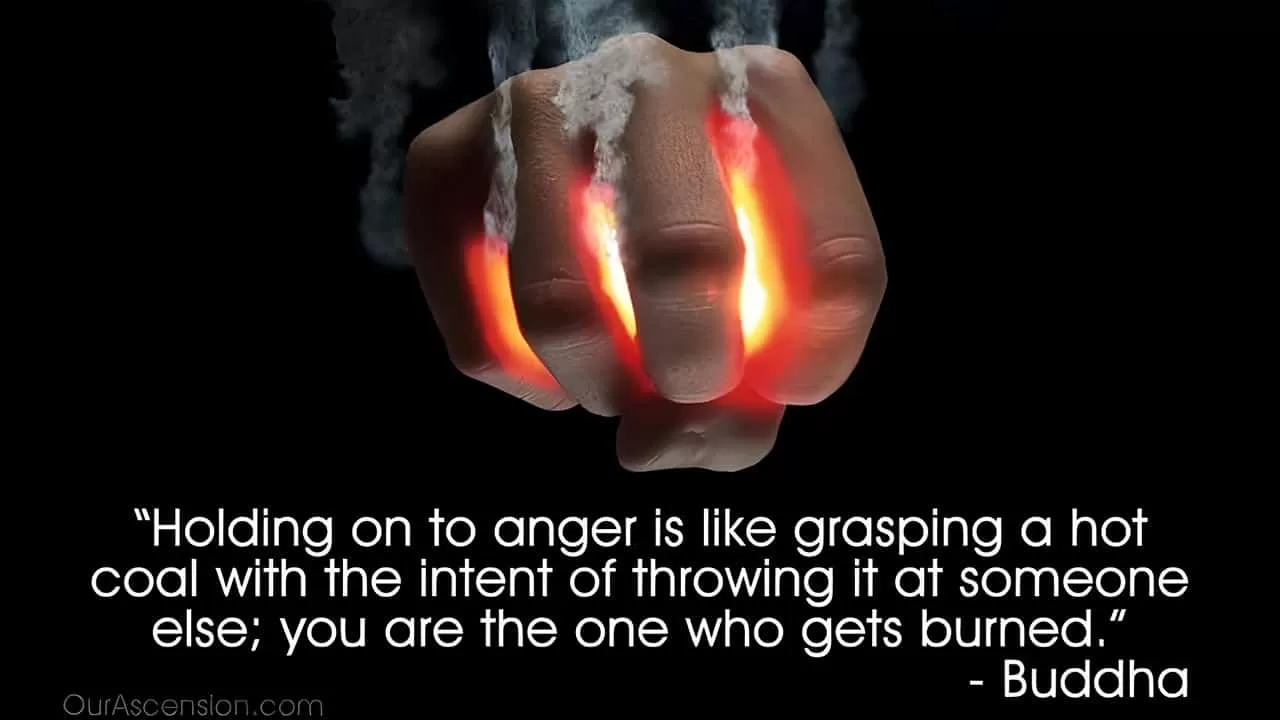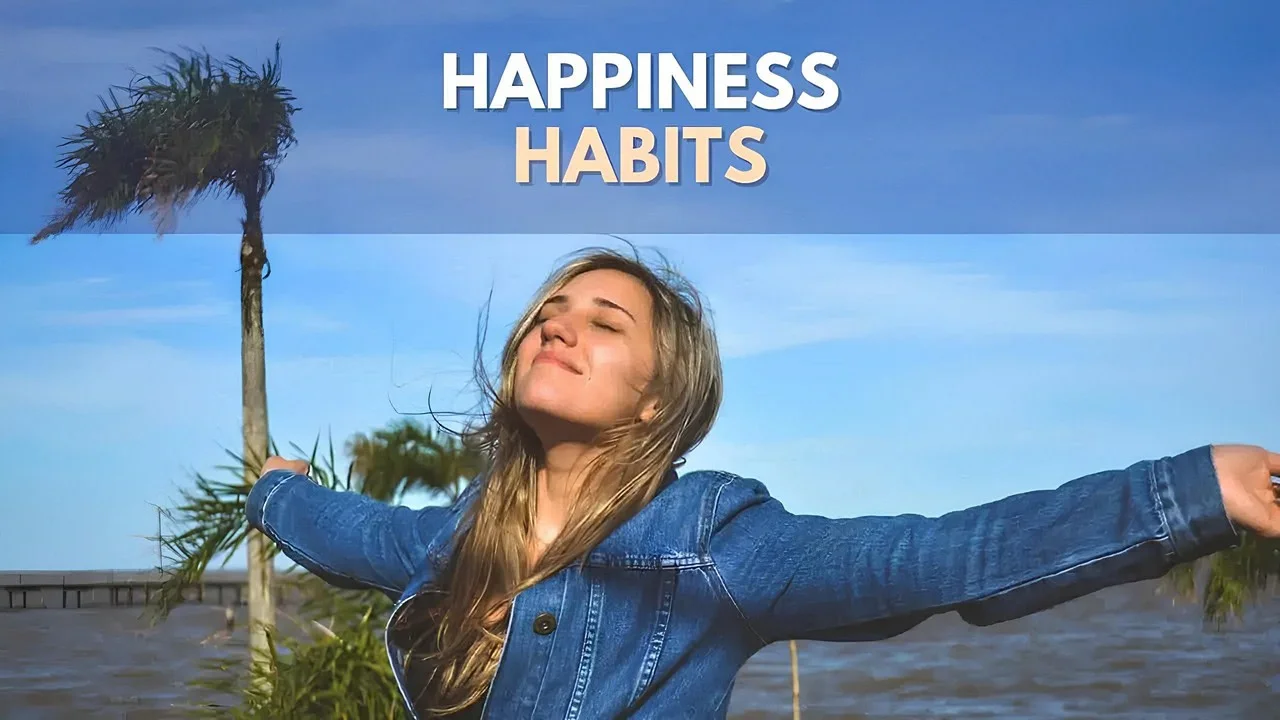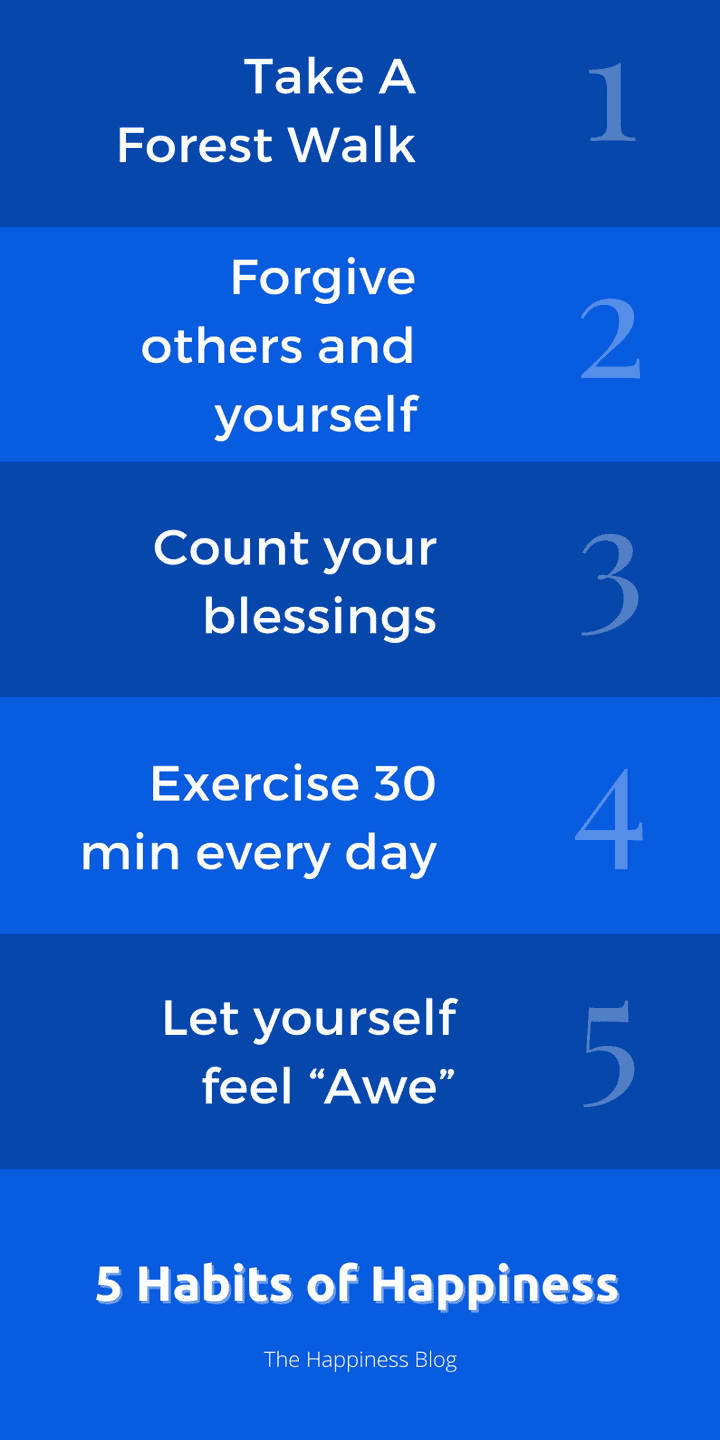📅 28 Jun 2024 • 📖 11 min read
— Researched and reviewed by Dr. Sandip Roy.Happiness habits are routines that increase your positive emotions and mental well-being.
Positive psychologists tell us these habits (“interventions”) boost our happiness, help us cope better with stress and harsh times, and make us more resilient to anxiety and depression.
In positive psychology, the technical term for happiness is subjective well-being (SWB).
Here are 10 happiness habits from positive psychology:
1. Take A Forest-Walk (Shinrin-Yoku).
Taking a walk in the forest is an easy yet powerful way to boost your mood and health. It’s called shinrin-yoku, or forest bathing, in Japan, and it’s gained popularity in the West in recent years.
There is much scientific evidence to support its benefits.
A study in the International Journal of Environmental Research and Public Health found that shinrin-yoku can cause higher parasympathetic activity (more relaxation) and lower sympathetic activity (less stress).

Healthy young women who walked in the forest (a) felt more comfortable and relaxed, and had better mood states and lower anxiety levels, than those who walked in a city area (b).
Another study found that exposure to nature is associated with improved cognitive function, brain activity, blood pressure, mental health, physical activity, and sleep.
The benefits of shinrin-yoku are thought to be due to several factors, including:
- The phytoncides (volatile organic compounds) emitted by trees have anti-inflammatory and antimicrobial properties.
- The negative ions found in forest air have been shown to improve mood and sleep.
- The calming and restorative effects of being in nature.
To practice shinrin-yoku, simply find a forested area and take a leisurely walk while paying attention to the sights, sounds, and smells of the forest.
Tips for getting the most out of it:
- Take deep breaths and focus on the fresh air.
- Walk slowly and mindfully, paying attention to your surroundings.
- You may sit down or lie on the ground and close your eyes to listen to the sounds of the forest.

2. Forgive Your Offenders. And Yourself Too.
Everyone can be forgiven because forgiveness is for you, first and foremost.
There are two types of forgiveness:
- Decisional forgiveness – when you decide to forgive someone, even if you still feel angry or hurt. It’s your decision to change your behavior towards the person, not your feelings.
- Emotional forgiveness – when you truly let go of the negative feelings towards your offender. It’s about giving up your anger and resentment towards the person, not just changing your behavior.
To forgive and forget is a well-known idiom. This study found it to be true – that emotional forgiveness has a strong influence on forgetting about the incident.
- Decisional forgiveness, that is, holding on to anger and resentment, keeps the hurt alive.
- Emotional forgiveness can help you feel better, reduce your risk of heart disease, improve blood pressure, and reduce stress, anxiety, and depression.
Forgiveness can be difficult, especially for serious offenses. But forgiving doesn’t mean condoning their actions or denying your pain. It means you’re releasing yourself from the burden of negative emotions.
Learn to forgive others, whether they deserve it to not. You don’t even have to tell them you forgave them.
And don’t forget to forgive yourself too.
Buddha said, that holding on to anger is like grasping a hot coal with the intent of throwing it at someone else; you are the one who gets burned.

3. Start The “3 Good Things” Practice
The Three Good Things (TGT) is writing the three good things that happened to you during the day.
Research (by Lyubomirsky & Sheldon and Seligman & Steen) shows this simple practice can boost your happiness levels.
This happiness habit forces you to focus on the positive aspects of your life, which can train your brain to be more optimistic and hopeful.
When you write down the 3 good things, make sure you let yourself re-live how they made you feel.
Here are some tips to get better at it:
- Be specific. Don’t just write, “I had a good day.” Instead, write something like “I got a promotion at work,” or “I spent time with my loved ones.”
- Focus on the positive. Even if you had a tough day, there were probably still some good things that happened. Maybe you saw a beautiful sunset, or you ate a delicious meal.
- Be grateful. When you write down your good things, take a moment to appreciate them. Think about how lucky you are to have experienced them.
Give the 3 Good Things practice a try today.
4. Exercise At Least 5 Days A Week
Exercise daily to boost your mood and happiness, whatever your age, sex, or physical condition.
Physical activity releases endorphins, which have mood-boosting effects. Exercise can also help to reduce stress, improve sleep quality, and increase self-confidence.
Aim for at least 30 minutes of moderate-intensity exercise most days of the week. Even short bursts of activity can make a difference. Try taking a brisk walk, doing some bodyweight exercises, or playing a sport.
Some extra benefits of exercise for happiness are:
- Exercise distracts you from negative thoughts and worries.
- It increases social connectedness when you exercise with others.
- It helps you have better control of your body, which then boosts your confidence.
John Ratey, the world’s most known exercise researcher, says:
“Exercise generates the release of serotonin, norepinephrine, and dopamine in the brain. People’s mood significantly increased after exercise.”

5. Have More Experiences of Awe
Awe is a difficult sensation to describe. We may equal awe to a mild fear mixed with wide-eyed wonder.
You get a sense of awe when you come across something that’s exceptionally vast and incredibly powerful.
Awe can exhilarate us while also making us feel a little weak in the knees. So, in a way, awe is a little less joyful than pure wonder. In any case, it is light-years away from the irritatingly ubiquitous urban jargon ‘awesome.’
Awe is a combination of fear, admiration, delight, and surprise.
To let yourself feel “The Little-Known Power of Awe,” look at some old pictures from your past, watch a flower sway in the spring breeze, or peer into the vast expanse of a late evening sky.
Psychologists Paul Piff, Pia Dietze, and Dacher Keltner tell us how to find awe in their paper Awe, the Small Self, and Prosocial Behavior:
Awe arises in evanescent experiences. Looking up at the starry expanse of the night sky. Gazing out across the blue vastness of the ocean. Feeling amazed at the birth and development of a child.
The first-ever book on awe was written by Paul Pearsall, clinical neuropsychologist: Awe: The Delights and Dangers of Our Eleventh Emotion. It was also his last book.
Pearsall saw awe as the 11th emotion, beyond the scientifically accepted ten emotions of love, fear, sadness, pride, embarrassment, curiosity, enjoyment, despair, guilt, and anger.
Pearsall wrote,
If we … put in the effort to try to understand a little more about life’s meaning, awe becomes less a feeling of being high and more a feeling of deep immersion in any and all of life’s processes.
Watch Felix Baumgartner jump from a helium balloon floating 39 km (ca. 24 miles) above the earth to set a world record for the highest skydive, and feel awe:
6. Sleep Well, Sleep Full.
According to the National Sleep Foundation, Mayo Clinic, and CDC, the recommended amount of sleep for adults is 7–9 hours per night regularly for optimal health.
Now, what research tells us is that proper sleep can have a major impact on our life-satisfaction and well-being.
- Studies have shown that people who get adequate quality sleep are more likely to rate their lives as happier and more satisfied. Good sleep quality can also drastically increase happiness and should be promoted as a public health value.
- On the other hand, poor or inadequate sleep can cause irritability, stress, and negative emotions such as anger, sadness, and mental exhaustion, which can lead to emotional disorders, depression, and anxiety.
Better sleep also improves memory and creativity, reduces inflammation and stress, and boosts brain functioning.
Want to know how to improve your sleep habits? Here’s our well-researched post on sleep science hacks here: Six Scientific Sleep Hacks.

7. Meditate Ritually
Meditation is the key to peace of mind.
Physical activity increases physical strength and immunity, but meditation restores the brain, enhances memory, and increases empathy. Make meditation a daily ritual for increased happiness.
Yoga can also bring inner peace and make you calmer. Yoga and meditation are practiced for eons in hundreds of forms. Need reasons to start practicing meditation and yoga? Here they are:
- Heals your mind and reduces stress and anxiety
- Increases focus
- Boost memory and brain power
- Reduces blood pressure
- It makes you better at dealing with stressful conditions
- Regular meditation and yoga make you emotionally strong
- Happiness increases
Take a look at this beginner-level guide: Mindfulness In 7 Steps.
8. Laugh More Often
A person who can’t laugh at himself, can’t make others laugh too.
Look for ways to laugh more. There are several health benefits of laughing:
- Laughing releases endorphins—your body’s feel-good chemicals
- Laughing helps in better oxygenation of the blood
- Good for skin health and reduces dark circles
- Laughter enhances the healing process
- A smiling face looks more attractive
- Brings a positive state of mind
- It reduces stress hormones
Here are a few ways to laugh more:
- Make friends with someone who has a good sense of humor
- Watch comedy shows and laughter gags
- Follow funny people on social media
- Spend more time with your lovable
- Spend time with kids
- Play fun games
9. Accept Yourself And Love Yourself
The worst part of this life is that we don’t accept ourselves. Nobody knows you better than you, my friend. It is possible that you may have failed to complete your goals, but it doesn’t mean you should blame yourself for that for the rest of your life.
When you accept yourself, you develop self-confidence. When you develop self-confidence, you start valuing yourself and your role in the world.
Acceptance and Commitment Therapy teaches us to be psychologically flexible. It helps us win the inner battle that is based on our past experiences.
10. Embrace Change & Stay Optimistic
Change is the universal rule of nature. Of course, embracing change comes with fear and uncertainty.
But you don’t have to know the whole path where change will take you. You just need to take one step at a time to balance out the fear and uncertainty.
- Accept what is, and move on.
- Start facing your fears head-on.
- Let your overall tone of life be one of optimism.
- Don’t waste time blaming anyone—yourself, other people, or circumstances.
Father of Modern Positive Psychology, Martin Seligman lays out three strategies to override your inner pessimist:
- accept setbacks mindfully,
- challenge your negative thought patterns,
- try to find out what could be alternative explanations for seemingly bad events.
7 Simple Habits To Be Happy Every Day
- Take time for yourself. A few times a day, stop what you’re doing and spend time alone with your thoughts, doing nothing but being.
- Make time for friends and family. Meet your friends, even if you only have time for a quick chat over a call. Set aside quality time to spend with your loved ones.
- Do something you love every day. Whether it’s walking your dog or volunteering at the animal shelter, find something that you love to do every day.
- Make a to-do list every morning. Write down the things you need to get done when you wake up. Better yet, make that to-do list the previous night.
- Be thankful and blessed. Every day, make a conscious effort to be grateful for what you have, even if you have little. I keep a midday gratitude reminder on my phone. I also do this every night before bed.
- Do something nice for someone else. Do something nice for someone else every day, whether small or big.
- Say no to some things. Every so often, we get so busy that we end up saying yes to things that are not good for us. Try to say no to some things and focus on your things.
Final Words
- A habit is an act you do without paying much attention.
- A ritual is just the opposite — it needs intentional focus.
So, start with a happiness ritual, and keep at it patiently so that it turns into a happiness habit.
“Happiness is a state of being, not a place to arrive at.” — Robert Holden, PhD
√ Please share it with someone if you found this helpful.
√ Also Read:
- 10 Greatest Happiness Hacks From Positive Psychology
- 7 Ways To Sustain Happiness & Stop It From Slipping Away
- Beautiful Photo Book: 50 Greatest Positive Psychology Quotes
• Our Story!